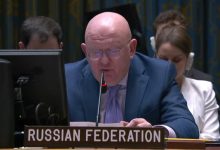
The future of Christian churches on the continent depends on the ability to develop an authentic African Christianity, moving away from its Westernized forms
By Moussa Ibrahim, executive secretary of the African Legacy Foundation – Johannesburg
FILE PHOTO. Ethiopian Orthodox Christians attend the Timkat celebrations at Medhane Alem Cathedral in Addis Ababa, Ethiopia on January 18, 2021. © Minasse Wondimu Hailu/Anadolu Agency via Getty Images
In May 2024, the United Methodist Church (UMC) held its General Conference in North Carolina in the US, where a controversial vote was passed to end a ban on openly practicing homosexual clergy. The conference was marred by controversy, as a large proportion of the African delegates, known for their opposition to this inclusion, were unable to obtain visas due to late invitations – a situation the African clergy had warned about in advance.
African congregations, deeply rooted in values such as family cohesion and the teachings of early African Christian missionaries, expressed strong opposition to the decision. In response, the entire UMC branch in Ivory Coast, representing nearly 1 million members, announced its departure from the denomination – a move that received scant attention in American UMC media. Now, other African branches of the UMC (South Africa, the Republic of the Congo, DRC, Zimbabwe, Ghana, and Nigeria) are contemplating similar actions, though financial constraints (as most funding comes from the US) and the UMC’s power structures pose significant challenges to their potential exits.
Christianity in Africa is as old as the religion itself. From the earliest days of the faith, Africa has played a pivotal role in the development and spread of Christianity. Yet today, many African Christians find themselves practicing a version of the faith that is largely divorced from its historical roots on the continent. This modern, Westernized Christianity often comes with a set of values, practices, and power structures that are alien to Africa’s spiritual and cultural identity. It is high time we recognize the importance of developing and supporting an authentically African Christianity – one that is rooted in our own history, values, and aspirations.
Ancient roots of Christianity in Africa
The narrative that Christianity is a Western import in Africa is a gross oversimplification. In reality, Africa has a long and rich Christian history dating back to the first century AD. It was in the African city of Alexandria, Egypt where one of the oldest Christian communities was established. By the mid-3rd century, Alexandria had become a major center of Christian thought and theology, producing influential figures such as Clement of Alexandria and Origen. These early African Christians were instrumental in shaping the doctrines and practices of the faith.
The Kingdom of Axum, located in modern-day Ethiopia, was one of the first states in the world to adopt Christianity as its official religion in the 4th century, under King Ezana. The Ethiopian Orthodox Tewahedo Church, which traces its roots back to this period, is one of the oldest Christian denominations in the world. This African form of Christianity developed independently of Rome and Constantinople, incorporating local traditions and practices into its worship.
Read more
Significantly, original African orthodox Christianity, particularly in Ethiopia, managed to coexist harmoniously with indigenous African spiritual traditions and Islam (we are talking here about the original Christian faith in Africa, not specifically about any of the modern or historic church organizations that have variations of ‘African Orthodox’ in their names). The Ethiopian Church developed in a context where it could integrate and respect local customs, rather than seek to eradicate them. This synthesis allowed for a unique expression of Christianity that embraced elements of African culture while fostering peaceful coexistence with Islam, as seen in Ethiopia’s long history of Christian-Muslim harmony.
The historical endurance of the Ethiopian Church was dramatically demonstrated during the 16th century when the Ethiopian Empire, under Emperor Gelawdewos, successfully repelled attempts by the Portuguese Jesuits to convert the population to Roman Catholicism. The Jesuit mission, which sought to impose Western Christian doctrines and practices, was ultimately rejected by the Ethiopian clergy and nobility, who were committed to maintaining their ancient faith. This resistance to foreign religious influence was rooted in a deep sense of spiritual and cultural identity, which has been a hallmark of Ethiopian Christianity.
In North Africa, the Church produced great thinkers such as Tertullian, Cyprian, and Augustine of Hippo. Augustine in particular is one of the most influential theologians in Christian history. Born in what is now Algeria, his works such as ‘Confessions’ and ‘The City of God’ continue to be studied worldwide, demonstrating that African Christians were not mere recipients of the faith but shapers of it. Augustine’s famous reflection, “Thou hast made us for thyself, O Lord, and our heart is restless until it finds its rest in thee,” captures the deep spiritual resonance of African Christianity with the search for meaning and divine connection – a search that is as relevant today as it was in his time.
Struggle for independence
For centuries, African Christianity was deeply connected to the cultural and spiritual fabric of the continent. It provided a framework for understanding the world, addressing social issues, and connecting with the divine in a manner that resonated with African values. This all began to change with the arrival of European colonialism in the 19th century.
The scramble for Africa in the late 19th century was not only a land grab but also a cultural conquest. Missionaries from Europe arrived with a version of Christianity that was inextricably linked to European values, norms, and power structures. These missionaries often dismissed African religious practices and traditions as pagan or backward, and in their place, they imposed a Westernized form of Christianity that aligned with colonial interests.
This Western Christianity became a tool of colonial domination, used to justify the subjugation of African peoples and the exploitation of their resources. The colonizers promoted the idea that African societies were inherently inferior and in need of European guidance, both spiritually and politically. This narrative was reinforced by the missionary schools, which taught African children that their indigenous cultures were primitive and sinful.
One notable example of this dynamic occurred in the Congo Free State (1885-1908, modern DRC), where Belgian King Leopold II established a brutal regime under the guise of spreading Christianity. The missionaries who accompanied Belgian forces were often complicit in the exploitation and dehumanization of the local population. In response, African religious leaders such as Simon Kimbangu (1887-1951) emerged, promoting a form of Christianity that rejected colonial oppression and embraced African identity. Kimbangu founded the Kimbanguist Church in 1921, blending Christian teachings with African beliefs and calling for an end to colonial rule.
Kimbanguism spread rapidly, despite fierce opposition from the Belgian colonial authorities, demonstrating the powerful appeal of an Africanized Christianity that spoke to the people’s yearning for freedom and dignity. As Kimbangu himself proclaimed, “God has chosen Africa as the land of His revelation; we must not allow anyone to impose their interpretation on us.”
Read more
Similarly, in South Africa, the African National Congress (ANC) was heavily influenced by Christian leaders such as Isaiah Shembe, who founded the Nazareth Baptist Church in the early 20th century. Shembe’s teachings, which combined Christian doctrine with Zulu traditions, provided a spiritual foundation for the struggle against apartheid. His church became a center of resistance, where African culture and Christianity were celebrated together as a source of strength against colonial oppression.
’We had the Bible and they had the land’
Despite the rich history of African Christianity, the version of the faith that dominates much of the continent today is heavily Westernized. This is particularly evident in the rise of Pentecostal and Evangelical movements, which often emphasize prosperity theology, individualism, and a focus on material wealth. These movements, which are frequently funded and supported by Western churches, have gained a significant following in Africa over the past few decades.
While these Westernized forms of Christianity have attracted large numbers of adherents, they have also been criticized for promoting values that are at odds with African communal traditions. The emphasis on individual success and wealth accumulation can undermine the communal bonds that have traditionally held African societies together. Moreover, the prosperity gospel often leads to the exploitation of the poor, as congregants are encouraged to give money to their churches in hope of receiving financial blessings in return.
Politically, westernized Christianity can also serve to perpetuate neo-colonial power structures. Many of these churches preach a message of submission to authority and discourage political activism, which can have the effect of maintaining the status quo. This is particularly concerning in countries where Western-supported corrupt and authoritarian regimes are in power, as it can stifle the efforts of those who seek to bring about positive change. South African theologian Desmond Tutu famously warned, “When the missionaries came to Africa, they had the Bible and we had the land. They said, ‘Let us pray.’ We closed our eyes. When we opened them, we had the Bible and they had the land.”
Economically, the dominance of Westernized Christianity in Africa can have significant consequences. The importation of Western religious practices often comes with a corresponding importation of Western goods, services, and ideologies. This can lead to a situation in which African churches are heavily reliant on foreign aid and funding, which can undermine their independence and make them more susceptible to external influence.
Moreover, the rise of Western Christianity has coincided with a broader cultural shift in the West, where the church has increasingly aligned itself with identity politics, often at the expense of its traditional focus on cohesion, tradition, and its foundational commitment to social and economic justice. This shift has led to fragmentation within Western churches, where political and cultural allegiances often take precedence over the universal Christian call to love, unity, and service.
The emphasis on identity politics has splintered communities into competing interest groups, diluting the church’s role as a unifying force and moral guide. As a result, the church’s prophetic voice on issues like poverty, inequality, and the pursuit of peace has been weakened, reducing Christianity to just another platform for political expression.
’United spiritual front’
The development of an African ‘liberation theology’ presents a powerful opportunity to create a theological framework that resists being co-opted by Western cultural colonialism and speaks directly to the unique social, economic, and political realities of the African continent. Similar to the Latin American variants of liberation theology in the 1960s, an African liberation theology would be grounded in the continent’s own rich spiritual heritage and cultural context.
A historical precedent for this can be seen in the work of Kenyan theologian John Mbiti, who in the 1960s and 1970s argued for an African theology that was deeply rooted in the continent’s cultural heritage. Mbiti’s work challenged the dominance of Western theological frameworks and emphasized the need for African Christians to develop their own theological perspectives that resonated with their lived experiences.
Furthermore, African Christianity shares deep spiritual and moral affinities with Eastern Christianity, including the Russian Orthodox Church. Both traditions emphasize the communal aspects of faith, the importance of spiritual humility, and a deep sense of reverence for tradition and the sacred. These values stand in contrast to the individualism, materialism, and consumer-driven spirituality that characterize many Westernized forms of Christianity.
Read more
This shared spiritual heritage provides a strong foundation for collaboration between African and Eastern Orthodox churches in building a ‘United Spiritual Front’ against the encroachment of neo-colonialist forms of Christianity. By working together, these churches can resist the homogenization of Christian practices and values, asserting instead a vision of the faith that is rooted in the diverse cultures and traditions of their respective regions.
’The gospel in Africa is not something new’
To move forward, it is essential that African Christians reclaim their spiritual heritage and develop a form of Christianity that is truly African. This means a conscious rejection of Western-imposed faith structures while reinterpreting and adapting Christian teachings in a way that aligns with African values, traditions, and aspirations.
One way to do this is by embracing the rich liturgical and theological traditions of Africa’s ancient churches, such as the Ethiopian Orthodox Tewahedo Church and the Coptic Orthodox Church of Egypt. These churches have maintained their independence and cultural distinctiveness for centuries, offering a model of how Christianity can be practiced in a way that is rooted in African culture.
Another approach is to support the growth of indigenous African Christian movements that blend traditional African spirituality with Christian teachings. These movements have already demonstrated their ability to resonate with African believers and address the specific social, political, and economic challenges facing the continent. As Kwame Bediako, a renowned Ghanaian theologian, once said, “The gospel in Africa is not something new. It has been known, experienced, and lived for centuries. Our task is to recover and reinterpret this African heritage in ways that speak to our present realities.”
Furthermore, African Christians must be encouraged to engage with their faith critically and intellectually, drawing on the rich tradition of African Christian thought from figures such as John Chilembwe (1871-1915) and Julius Nyerere (1922-1999), who developed an African theology of liberation and justice. By doing so, they can develop a theology that speaks to the realities of African life and provides a framework for addressing the continent’s most pressing issues.
The future of Christianity in Africa depends on our ability to reclaim and develop an authentic African Christianity. This requires a conscious effort to move away from the Westernized forms of the faith that have been imposed on us and to rediscover the rich spiritual heritage that has existed on this continent for nearly two millennia. As the Nigerian theologian Lamin Sanneh once observed, “Christianity in Africa is at its best when it is most authentically African. It is then that it speaks most powerfully to the human condition.”
The statements, views and opinions expressed in this column are solely those of the author and do not necessarily represent those of RT.




